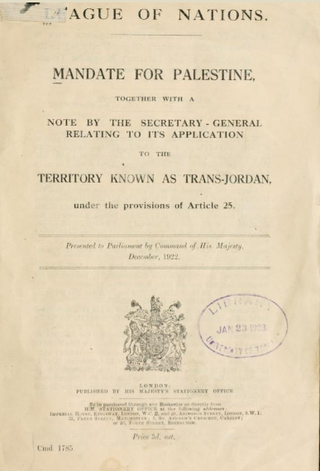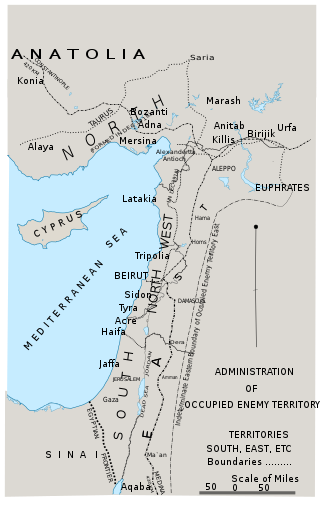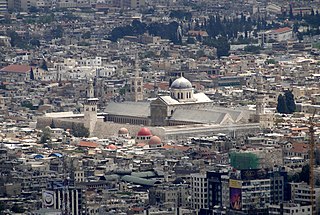Related Research Articles

The San Remo conference was an international meeting of the post-World War I Allied Supreme Council as an outgrowth of the Paris Peace Conference, held at Castle Devachan in Sanremo, Italy, from 19 to 26 April 1920. The San Remo Resolution passed on 25 April 1920 determined the allocation of Class "A" League of Nations mandates for the administration of three then-undefined Ottoman territories in the Middle East: "Palestine", "Syria" and "Mesopotamia". The boundaries of the three territories were "to be determined [at a later date] by the Principal Allied Powers", leaving the status of outlying areas such as Zor and Transjordan unclear.

The Emirate of Transjordan, officially known as the Amirate of Trans-Jordan, was a British protectorate established on 11 April 1921, which remained as such until achieving formal independence in 1946.

This is a partial timeline of Zionism in the modern era, since the start of the 16th century.

The Latin Church in the Middle East represents members of the Latin Church of the Catholic Church in the Middle East, notably in Turkey and the Levant. Latin Catholics are subject to the Latin Patriarchate of Jerusalem and employ the Latin liturgical rites, in contrast to Eastern Catholics who fall under their respective church's patriarchs and employ distinct Eastern liturgical rites, while being in full communion with the worldwide Catholic Church. Latin Catholics in the Middle East are often of European descent.

The Treaty of Sèvres was a 1920 treaty signed between the Allies of World War I and the Ottoman Empire. The treaty ceded large parts of Ottoman territory to France, the United Kingdom, Greece and Italy, as well as creating large occupation zones within the Ottoman Empire. It was one of a series of treaties that the Central Powers signed with the Allied Powers after their defeat in World War I. Hostilities had already ended with the Armistice of Mudros.

Yishuv, Ha-Yishuv, or Ha-Yishuv Ha-Ivri denote the body of Jewish residents in the Land of Israel prior to the establishment of the State of Israel in 1948. The term came into use in the 1880s, when there were about 25,000 Jews living across the Land of Israel, and continued to be used until 1948, by which time there were some 630,000 Jews there. The term is still in use to denote the pre-1948 Jewish residents in the Land of Israel.

A capitulation is a treaty or unilateral contract by which a sovereign state relinquishes jurisdiction within its borders over the subjects of a foreign state. As a result, the foreign subjects are immune, for most civil and criminal purposes, from actions by courts and other governmental institutions in the state that makes the capitulation.
Protectorate of missions is a term for the right of protection exercised by a Christian power in a Muslim or other non-Christian country with regard to the persons and establishments of the missionaries. The term does not apply to all protection of missions, but only to that permanently exercised in virtue of an acquired right, usually established by a treaty or convention, voluntarily consented to or accepted by the non-Christian power after more or less compulsion. The object of the protectorate may be more or less extensive, as it may embrace only the missionaries who are subjects of the protecting power or apply to the missionaries of all nations or even to the native Christians who are their recent converts.

The partition of the Ottoman Empire was a geopolitical event that occurred after World War I and the occupation of Istanbul by British, French and Italian troops in November 1918. The partitioning was planned in several agreements made by the Allied Powers early in the course of World War I, notably the Sykes–Picot Agreement, after the Ottoman Empire had joined Germany to form the Ottoman–German Alliance. The huge conglomeration of territories and peoples that formerly comprised the Ottoman Empire was divided into several new states. The Ottoman Empire had been the leading Islamic state in geopolitical, cultural and ideological terms. The partitioning of the Ottoman Empire after the war led to the domination of the Middle East by Western powers such as Britain and France, and saw the creation of the modern Arab world and the Republic of Turkey. Resistance to the influence of these powers came from the Turkish National Movement but did not become widespread in the other post-Ottoman states until the period of rapid decolonization after World War II.
An international city is an autonomous or semi-autonomous city-state that is separate from the direct supervision of any single nation-state.
The postage stamps and postal history of Palestine emerges from its geographic location as a crossroads amidst the empires of the ancient Near East, the Levant and the Middle East. Postal services in the region were first established in the Bronze Age, during the rule of Sargon of Akkad, and successive empires have established and operated a number of different postal systems over the millennia.
Following are timelines of the history of Ottoman Syria, taken as the parts of Ottoman Syria provinces under Ottoman rule.

The Jerusalem Subdistrict was one of the subdistricts of Mandatory Palestine. It was located in and around the city of Jerusalem. After the 1948 Arab–Israeli War, on the Israeli side of the Green Line, the district was integrated into the Jerusalem District. On the other side, the West Bank was annexed into Jordan, the subdistrict was merged with Ramallah Subdistrict to form Jerusalem Governorate, one of three Jordanian governorates in the West Bank.

The Consulate General of France in Jerusalem began its tumultuous history in the early 17th century. In 1535, the date of the first Capitulation between France and the Ottoman Empire, France was granted the right to appoint consuls in the cities of the Empire. The Capitulations constituted the legal basis of the French protectorate over the Holy Places, Catholic Christians, and by extension, Orthodox Christians. In 1623, King Louis XIII appointed the first consul in Jerusalem "for the Glory of God and to relieve the pious pilgrims who by devotion visit the Holy Places." The presence of consuls in Jerusalem was intermittent until 1843. Amidst the growing competition between European powers over the exclusive protectorate that France was entitled to exercise over Christians, the rank of the Consul in Jerusalem was raised to that of a Consul General in 1893. Despite the abolition of France's protectorate over the Latins and the Turkish-ruled Holy Places in 1914, the Consulate General tried to maintain and expand its influence in Palestine. Since the creation of the state of Israel in 1948, the Consulate General of France in Jerusalem has held the status of a quasi-embassy. The consulate is responsible for the area of the corpus separatum and the occupied territories. The consulate's districts include Jerusalem, the Gaza Strip and the West Bank. The Consulate General is independent from the Embassy of France in Tel Aviv and does not have official diplomatic relations with Israel. All contacts with the State of Israel lie exclusively within the jurisdiction of the embassy in Tel Aviv. Since its establishment in 1994, the consulate has been the French diplomatic representative to the Palestinian National Authority.

The Mandate for Palestine was a League of Nations mandate for British administration of the territories of Palestine and Transjordan, both of which had been conceded by the Ottoman Empire following the end of World War I in 1918. The mandate was assigned to Britain by the San Remo conference in April 1920, after France's concession in the 1918 Clemenceau–Lloyd George Agreement of the previously-agreed "international administration" of Palestine under the Sykes–Picot Agreement. Transjordan was added to the mandate after the Arab Kingdom in Damascus was toppled by the French in the Franco-Syrian War. Civil administration began in Palestine and Transjordan in July 1920 and April 1921, respectively, and the mandate was in force from 29 September 1923 to 15 May 1948 and to 25 May 1946 respectively.

The Occupied Enemy Territory Administration (OETA) was a joint British, French and Arab military administration over Levantine provinces of the former Ottoman Empire between 1917 and 1920, set up on 23 October 1917 following the Sinai and Palestine Campaign and Arab Revolt of World War I. Although it was declared by the British military, who were in control of the region, it was followed on 30 September 1918 by the 1918 Anglo-French Modus Vivendi in which it was agreed that the British would give the French control in certain areas, and the Hashemites were given joint control of the Eastern area per T.E. Lawrence's November 1918 "Sharifian plan".

Mandatory Palestine was a geopolitical entity established between 1920 and 1948 in the region of Palestine under the terms of the League of Nations Mandate for Palestine.

Syria or Sham is the name of a historical region located east of the Mediterranean Sea in Western Asia, broadly synonymous with the Levant. Other synonyms are Greater Syria or Syria-Palestine. The region boundaries have changed throughout history. In modern times, the term "Syria" alone is used to refer to the Syrian Arab Republic.

The Arab Orthodox Movement is a political and social movement aiming for the Arabization of the Greek Orthodox Patriarchate of Jerusalem, the church overseeing Orthodox communities in Palestine, Israel and Jordan.
References
- 1 2 Catherine Nicault, "The End of the French Religious Protectorate in Jerusalem (1918–1924)" (Bulletin du Centre de recherché français à Jérusalem, No. 4, March 1999, pp. 77–92).
- 1 2 Custodia Terrae Sanctae: "The Question of the Holy Places."
- ↑ San Remo Resolution.
- ↑ The Palestine Order in LoN Council - Mandatory order (10 August 1922).
- ↑ Sergio I. Minerbi, The Vatican and Zionism: Conflict in the Holy Land, 1895–1925 ( ISBN 0-19-505892-5).